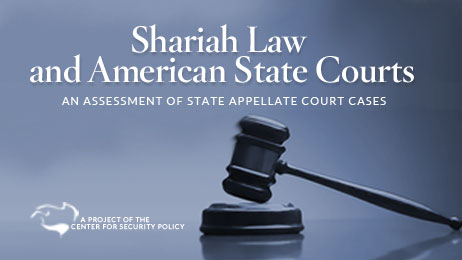New Study Finds Shariah Law Involved in Court Cases in 23 States

 The Center for Security Policy today released an in-depth study– Shariah Law and American State Courts: An Assessment of State Appellate Court Cases. The study evaluates 50 appellate court cases from 23 states that involve conflicts between Shariah (Islamic law) and American state law. The analysis finds that Shariah has been applied or formally recognized in state court decisions, in conflict with the Constitution and state public policy.
The Center for Security Policy today released an in-depth study– Shariah Law and American State Courts: An Assessment of State Appellate Court Cases. The study evaluates 50 appellate court cases from 23 states that involve conflicts between Shariah (Islamic law) and American state law. The analysis finds that Shariah has been applied or formally recognized in state court decisions, in conflict with the Constitution and state public policy.
Some commentators have tried to minimize this problem, claiming, as an editorial in yesterday’s Los Angeles Times put it that, “…There is scant evidence that American judges are resolving cases on the basis of shariah.” To the contrary, our study identified 50 significant cases just from the small sample of appellate court published cases.
Others have asserted with certainty that state court judges will always reject any foreign law, including Shariah law, when it conflicts with the Constitution or state public policy. The Center’s analysis, however, found 15 trial court cases, and 12 appellate court cases, where Shariah was found to be applicable in these particular cases.
The facts are the facts: some judges are making decisions deferring to Shariah law even when those decisions conflict with constitutional protections.
On the releasing the study, the Center for Security Policy’s President, Frank J. Gaffney, Jr., observed:
These cases are the stories of Muslim American families, mostly Muslim women and children, who were asking American courts to preserve their rights to equal protection and due process. These families came to America for freedom from the discriminatory and cruel laws of Shariah. When our courts then apply Shariah law in the lives of these families, and deny them equal protection, they are betraying the principles on which America was founded.
Key Findings:
- At the trial court level, 22 decisions were found that refused to apply Shariah; 15 were found to have utilized or recognized Shariah; 9 were indeterminate; and in 4 cases Shariah was not applicable to the decision at this level, but was applicable at the appellate level.
- At the appellate Court level: 23 decisions were found that refused to apply Shariah; 12 were found to have utilized or recognized Shariah; 8 were indeterminate; and in 7 cases Shariah was not applicable to the decision, but had been applicable at the trial court level.
- The 50 cases were classified into seven distinct “Categories” of dispute: 21 cases dealt with “Shariah Marriage Law”; 17 cases involved “Child Custody”; 5 dealt with “Shariah Contract Law”; 3 dealt with general “Shariah Doctrine”; 2 were concerned with “Shariah Property Law”; 1 dealt with “Due Process/Equal Protection” and 1 dealt with the combined “Shariah Marriage Law/Child Custody.”
- The 50 cases were based in 23 different states: 6 cases were found in New Jersey; 5 in California; 4 each in Florida, Massachusetts and Washington; 3 each in Maryland, Texas and Virginia; 2 each in Louisiana and Nebraska; and 1 each in Arizona, Arkansas, Delaware, Illinois, Indiana, Iowa, Maine, Michigan, Minnesota, Missouri, New Hampshire, Ohio and South Carolina.
Shariah Law and American State Courts: An Assessment of State Appellate Court Cases includes summaries of a sample of twenty cases, as well as the full published texts for all fifty cases.
Mr. Gaffney added:
This study represents a timely contribution to the debate developing around the country: To what extent is the Islamic politico-military-legal doctrine of Shariah being insinuated into the United States? The analysis complements and powerfully reinforces the warnings contained in the Center’s bestselling 2010 “Team B II” Report, Shariah: The Threat to America. It confirms that Shariah’s adherents are making a concerted effort to bring their anti-constitutional code to this country.
Together with follow-on analyses now in preparation, we hope to equip those who share the Center’s commitment to the Constitution of the United States, to the liberties it guarantees and to the democratic government it mandates to thwart those like the Muslim Brotherhood who would supplant freedom with Shariah law. Clearly, we must work to keep America Shariah-free, or risk inexorably losing the country we love.
The full text of the study, including text from the court cases and tables displaying the findings, can be found at www.ShariahInAmericanCourts.com.
- Military Starship: How SpaceX Is About to Make America Globally Dominant - March 4, 2025
- The Cautionary Tale of Zheng He - December 4, 2024
- Frank Gaffney departs CSP after 36 years - September 27, 2024
